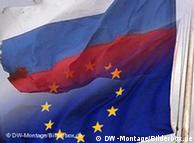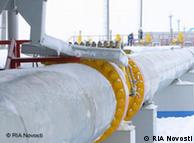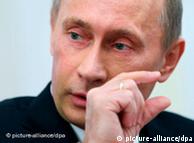RUSSIA | 25.11.2010
Putin calls for closer economic cooperation with the EU
Russia is aiming for a free trade zone and a common industrial policy with the European Union.
Prime Minister Vladimir Putin, writing in the German daily Sueddeutsche Zeitung on Thursday, said his goal was to create "a harmonious economic community from Lisbon to Vladivostok."
Cooperation between Russia and the EU could even result in a free trade agreement or similar forms of economic integration eventually leading to a "common continental market."
"We should be frank about it: The global economic crisis has revealed both Russia and the EU to be economically very vulnerable," Putin wrote.
Russia, he argued, was still too dependent on its energy exports, while the EU was in danger of jeopardizing its position on the international markets, due to a decrease in its industrial productivity.
"What's on the agenda: How can we trigger a new wave of industrialization to roll across Europe," Putin wrote.
Different takes on energy cooperation
 'Both Russia and the EU have been shown to be economically very vulnerable': Putin
'Both Russia and the EU have been shown to be economically very vulnerable': Putin
He suggested strategic alliances in key industries, including shipbuilding, car manufacturing, space exploration and the pharmaceutical industry.
Energy policy, Putin wrote, was another field where closer cooperation was needed. From nuclear technology to gas and oil exploitation, there was a need for closer ties with Brussels.
The European Union gets around 25 percent of its natural gas from Russia. In the past, however, Brussels has left little doubt that it wants to diversify its energy supply to reduce dependency on Russia.
Interruptions to the supply have in recent years lead to energy shortages in several EU member states.
Putin also called for easing and eventually lifting visa restrictions between the EU and Russia. This, he wrote, would bring about not the end but rather the beginning of true integration between his country and the 27-nation bloc.
Putin's comments preceded his visit to Germany, which starts on Thursday. He is scheduled to meet with German Chancellor Angela Merkel on Friday.
Merkel, meanwhile, has downplayed the chances of a possible free trade zone. Speaking to reporters in Berlin on Thursday, she pointed to Russian high tariffs and Moscow's trade relations with neighboring countries as potential stumbling blocks.
 Gas transit interruptions have led to tensions with Moscow
Gas transit interruptions have led to tensions with Moscow
"Of course we support the idea of a free trade zone between the EU and Russia but I have to pour a bit of cold water on it," she said.
"The steps that Russia has taken recently do not point in that direction."
She pointed out that Russia, not yet part of the World Trade Organization (WTO), has established trade ties with Kazakhstan and Belarus, countries whose statuses as potential WTO members are far less certain than Russia's.
EON, Gazprom on the agenda
Merkel and Putin are also expected to discuss German energy company EON possibly selling its shares in Russia's Gazprom.
Media reports on Wednesday suggested EON plans to drop the 3.5 percent stake it holds in the Russian energy giant.
EON had dismissed reports that it would sell its 4.5 billion euros ($6 billion) in shares, while a government spokesman in Berlin confirmed the issue was on the agenda of the Merkel-Putin talks.
The EU is Russia's largest trading partner, making up about one half of its foreign trade. Total trade in the first half of the year was $141.9 billion (106.3 billion euros), according to the Russian federal customs agency.
Author: Andreas Illmer, Martin Kuebler (AFP, dpa)
Editor: Nancy Isenson

Comments